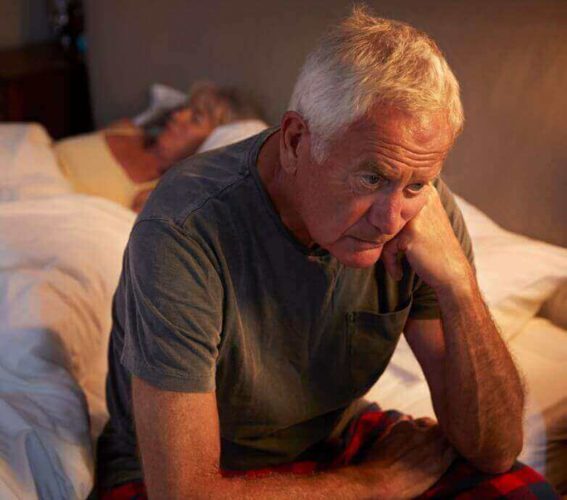Among the changes that are frequently noticed after a stroke are often sleep disturbances. In fact, more than half of stroke survivors report having some type of sleep problem. If the sleep problem occurs for a long period of time (over several months), it is considered a sleep disorder.
How sleep disorder affects your quality of life
Having a sleep disorder can make life unbearable, increasing post-stroke fatigue, irritability, and other emotional changes that the body is going through. Unfortunately, not sleeping properly can also increase the risk of another stroke. The good news is that there are things you can do to get a better night’s sleep.
Whether you’re sleeping too much or too little, you are not alone. Continue reading to find out what kind of sleep condition you may have. No matter the severity, there are effective ways of reducing its impact on your daily life.
Common Sleep Problems After Stroke
- Insomnia
Insomnia is a sleep condition characterized by extreme difficulty falling and staying asleep. After a night of insomnia, people report extreme daytime fatigue and irritability. This disorder should be addressed immediately; not getting enough sleep can negatively impact stroke recovery.
- Sleep-Related Breathing Disorders
The most common sleep disorder in the U.S., regardless of stroke history, is obstructive sleep apnea. It is characterized by abnormal breathing during sleep, heavy snoring, and periods of breathlessness. People usually report waking up many times in the night, choking and gasping for air. Others may not experience as many breathing obstructions, but report daytime fatigue due to a poor night’s sleep.
This condition is very serious and should not be taken lightly. Sleep apnea increases the risk of having a second stroke, as well as heart disorders, heart failure, high blood pressure, and other life-threatening conditions.
- Sleep-Wake Cycle Disorders
Many stroke survivors experience disturbances in their circadian cycles. When it gets dark, this triggers the body to sleep; when it gets light, this triggers the body to wake. However, in people with compromised circadian cycles, the brain doesn’t respond properly to dark and light sleep cues. As a result, some stroke survivors report feeling too energetic at bedtime, causing them to be up all night. On the other hand, they often feel incredibly tired when it starts getting light out and fall asleep during the daytime.
At-Home Ways To Alleviate Sleep Problems
Eliminate poor lifestyle habits.
You may be able to improve your night’s sleep by eliminating alcohol consumption, smoking, and caffeine consumption. In addition, losing weight has been shown to help those with sleep disorders, but only for individuals who are overweight or obese. Regardless of your weight, exercising moderately for at least 30 minutes, three times a week, can help you sleep better at night. Avoid taking melatonin supplements and other sleep medicines that have not been prescribed by your doctor; they can make the problem worse.
Adjust your sleeping position.
Sometimes, all you need is to evaluate the way you’re sleeping at night. We all have our favorite, but there are certain positions that can either make your sleeping condition worse or better. For those with sleep apnea, research shows that side sleeping is the most beneficial. For those with acid reflux or neck pain, sleeping on the back is the best position. The least beneficial position is stomach sleeping, which can worsen various conditions and cause joint pain as well as a stiff neck.
For most people, the position in which you fall asleep is rarely the position in which you wake up. At the end of the day, the best sleeping position for you is the one that allows you to have a full and comfortable night’s sleep. If you’re not waking up satisfied, it’s time to assume a new position.
Adapt a relaxing lifestyle.
Try to incorporate more movement throughout the day, like walking or exercise, as this can help tire you out for a better night’s sleep. Try to get some fresh air every day as well; go outside and feel the sunshine – you’d be surprised at the benefits of the outdoors. Make sure you do something you love for at least an hour every day – reading, arts and crafts, listening to or creating music, spending time with loved ones, etc.
Make your bedroom a sleep haven.
If you live somewhere that is noisy at night, try using earplugs or noise canceling headphones. If your bedroom has windows, hang some room darkening curtains or wear an eye mask. In addition, make sure the temperature in your room is cool and pleasant; if it’s too hot, you’ll have a hard time sleeping. In addition, avoid electronics for at least 30 minutes before bedtime. Blue light exposure can make it harder to fall and stay asleep.
Follow a bedtime routine.
Create a sleep schedule for yourself and stick to it. This can vary from person to person, depending on what time you want to fall asleep and wake up. Try to be asleep no later than 10:00 pm; don’t think of it as a curfew, think of it as your well-deserved beauty sleep. As you fall asleep and wake up at the same time every day, you’ll eventually fall into the habit and won’t even need an alarm!
In addition, follow a relaxation routine before bed to guide you towards those z’s. Do some yoga or light stretching, take a warm bath, do some reading, or listen to relaxing music. Bedtime routines vary from person to person; do whatever gets you in the sleepytime mood.


If you suffer from sleep apnea, and lifestyle changes aren’t helping, you may require other intervention. If your case is mild to moderate, your doctor may prescribe a special dental appliance, similar to a retainer, that should be worn at night. This will open up your airways and improve breathing.
However, if your case is severe, you may need a CPAP (continuous positive airway pressure) machine. This is the most successful treatment for obstructive sleep apnea. It consists of a machine (the size of a toaster) that blows heated, humidified air through a tube and into a mask worn on the face. The mask fits snugly so no air escapes. CPAP machines use air pressure to open up your airways, relieving breathing disturbances and snoring. Experiences that people have had and reported include higher energy levels, better memory, better perception, and an overall better quality of life.
Stroke treatement at CBC Health
If you or a loved one have suffered from a stroke, reach out to the specialists at CBC Health. We are offering a neuro-regenerative stroke treatment that is non-invasive, low-risk, and very effective at improving stroke recovery.



